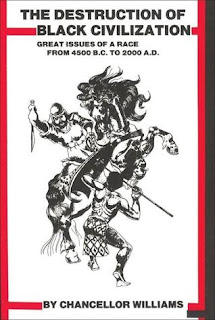The Destruction of Black Civilization: Great Issues of Race from 4500 B.C. to 2000 A.D. by Chancellor Williams
The Destruction of Black Civilization: Great Issues of Race from 4500 B.C. to 2000 A.D. by
Chancellor Williams
I have
been having quite a few conversations about how history is taught and why
history is taught the way it is. Take United States history for example. I was
never taught anything about treaties being broken between Native Americans and
the government. I was never taught anything about the Trails of Tears or the
massacres that took place as the states moved west. Even with slavery, I don’t
feel as if anything is taught outside of the fact that it once existed, that
Abraham Lincoln freed the slaves and the Civil War settled things. Don’t even
ask what I was taught about the Reconstruction Era because that was
non-existent. But the question becomes why and the answer is simply
exceptionalism. So when I look at Africa, a continent rich with history, I
wonder why I know so little about it. Williams with this book attempts to
answer the lingering questions around Africa. He focuses on the discoveries and
successes of Africans and stresses why so little credit is given to African
pioneers. Colonialism is the culprit and it was something that Africans have
battled against for thousands of years.
Williams
conducted a massive amount of research to create this book. With that being
said it is still only a comprehensive look at the history of Africa. It would
take, as he notes, many more volumes to reflect the true history of the entire
continent. What Williams focuses on is the colonial powers and overwhelming
conquest that occurred. Williams looks at religion and race as a factor, defining
what the term “mulatto” meant at the time, and how colorism even then formed a
caste system that would help bring down nations and force Africans out of their
ancestral home. The information and examples he gives are extensive and calls
into question a lot of what has been taught regarding who deserves credit for
many of the discoveries and accomplishments of that time. As Williams makes his
way through time to more current history, we reach what we know as modern-day
slavery and the slave trade.
There
is a plethora of information in this book to digest. It is almost overwhelming
the amount of information provided in this book especially since I don’t
believe I have ever seen a comprehensive look at African history. I will say
that Williams has a strong view of why he believes that so much of this
information isn’t openly provided and it is racism. Williams openly admits and
discusses throughout that he believes that most of the scholars that presented
information about Africa did so in such a way to promote the idea that Blacks
are inferior. He believes that revealing the truth about African history would
dispel any notion that Black people are lesser than, which was in many ways the
basis of slavery. It was the image of the Black Savage that allowed slavery to
exist for as long as it did. The information that Williams provided
historically contradicts that notion.
Williams is very honest about why he feels this way and even lays out in
the second section of this book a plan to help Black people living in the U.S.
especially, to make their way out of the grasp of white supremacy.
In the
end it doesn’t matter if you agree with Williams’s personal opinion or bias.
What he did with The Destruction of Black
Civilization was provide readers with a comprehensive history to Africa’s
history. There is much to be gained by being exposed to this information. But
so much more is needed. I definitely recommend this book. Essential reading if
interested in African or World History. I give this 4 out of 5 stars.




Comments
Post a Comment